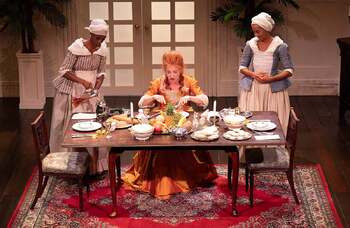The Women of Llanrumney review
London transfer of Azuka Oforka’s searing debut play highlights colonial cruelty, with magnetic performances from Nia Roberts and Shvorne Marks.
Set on a Jamaican sugar-cane plantation in 1765, Azuka Oforka’s piercing, powerful drama illuminates a dark and under-discussed chapter of British history through an absorbing human story of resistance, complicity, and class dynamics.
The plantation in question, Llanrumney, is named for the South Wales birthplace of Captain Henry Morgan – infamous pirate, slaveowner and sometime lieutenant governor of Jamaica. We quickly learn that the understaffed estate is on the verge of bankruptcy, the great mansion at its rotten heart occupied only by three women – dissipated, narcissistic noble Elisabeth and her enslaved housekeepers Annie and Cerys.
Developed through Sherman Theatre’s Unheard Voices programme – which platforms work by writers from under-represented demographics – the piece marks a confident, compelling debut from The Stage Debut award-winner Oforka. While the sprawling scenes, delivered at a stately pace, feel overstretched in places, the characters are brilliantly realised – richly drawn, full of compelling complications and fascinating contradictions. Director Patricia Logue handles the weighty subject matter with a deft touch, never shying away from the horror of the situation, yet finding moments of humour and touching, bittersweet intimacy.
Continues...
Stella-Jane Odoemelam’s elegant set presents a lavishly appointed dining room overlooked by an ivy-shrouded balcony, while leafy pot plants suggest the tropical environment on the other side of the white-painted walls. Ian Barnard’s natural soundscape provides another reminder of the Jamaican location with chirping insects and rustling foliage. Between scenes, composer Takisha Sargent introduces bursts of music, opening with airy, frivolous strings that grow more ominous, joined by rhythmic drumming as the situation on the island reaches boiling point.
As Elisabeth, Nia Roberts pitches her performance on just the right side of grotesquerie. Exhausted by a lifetime of debauchery and suddenly faced with losing the wealth and property that secure her autonomy, she sweeps about melodramatically, vacillating between enraged pride and teary hopelessness.
Shvorne Marks’ Cerys speaks little and spends much of her time hovering in the background, but remains a magnetic presence, watchful, focused and ferocious. In contrast, Suzanne Packer is a cold, more reserved presence as Annie, born into slavery, deeply indoctrinated into its hierarchies and desperate to cling to the small privileges that she is afforded as housekeeper. Packer gives a superbly nuanced performance, peeling back layers of fear, self-loathing and survival instinct as she begins to question her loyalties. And Matthew Gravelle brings depth and humour to several roles as a procession of male suitors prowling predatorily around Elisabeth – each awful in a different way.
Oforka skilfully uses these characters’ conflicting motivations and differing perspectives to build an incisive critique of colonialism, rightly excoriating those who made fortunes from enslavement and exploitation, and honouring those who resisted – or simply survived – the brutalities of the plantation system.
London, then at Sherman Theatre, Cardiff, from April 26-May 10.
For all the latest reviews from The Stage, sign up to our weekly reviews newsletter here
More Reviews
More Reviews
Recommended for you
Most Read
Across The Stage this weekYour subscription helps ensure our journalism can continue
Invest in The Stage today with a subscription starting at just £7.99













